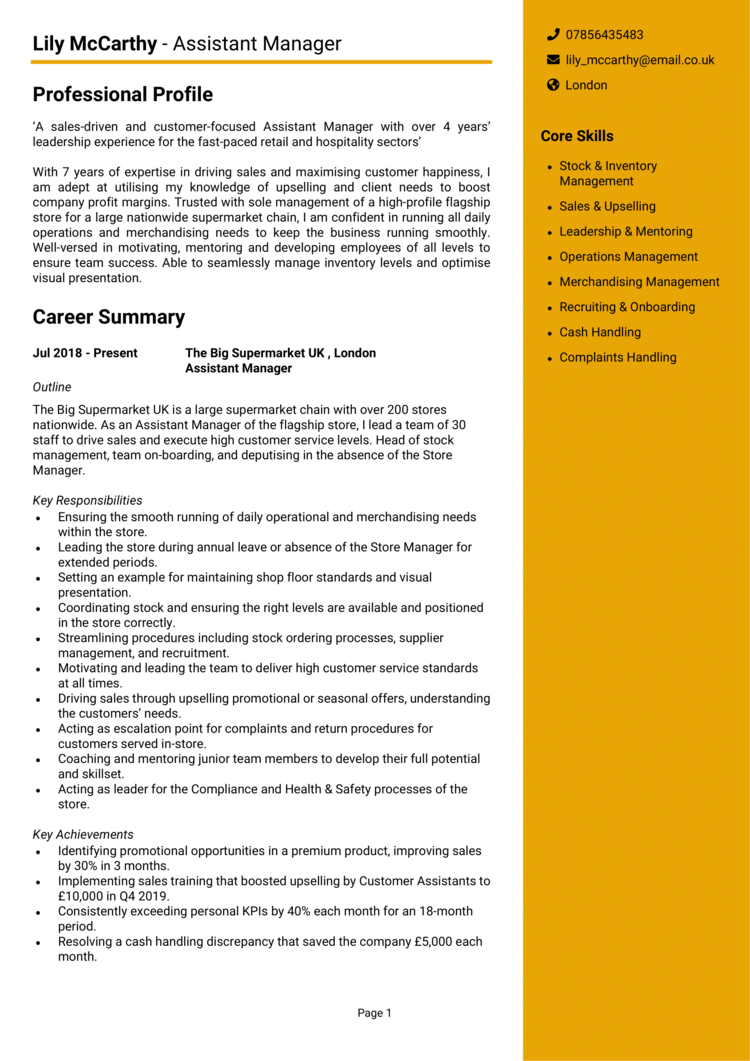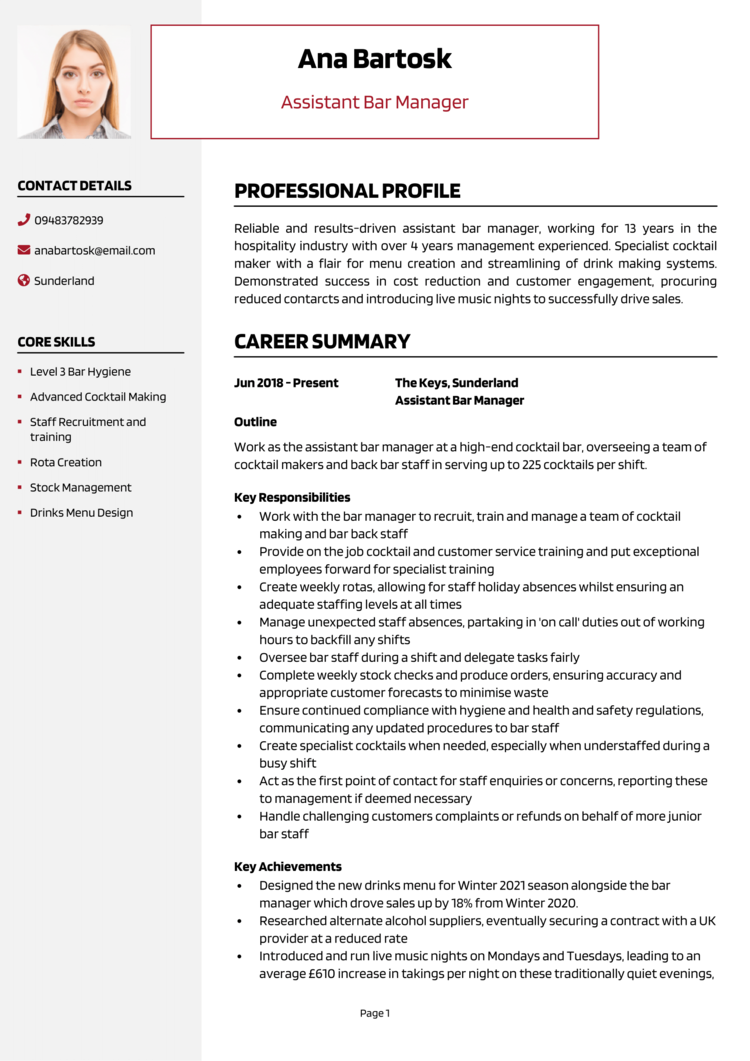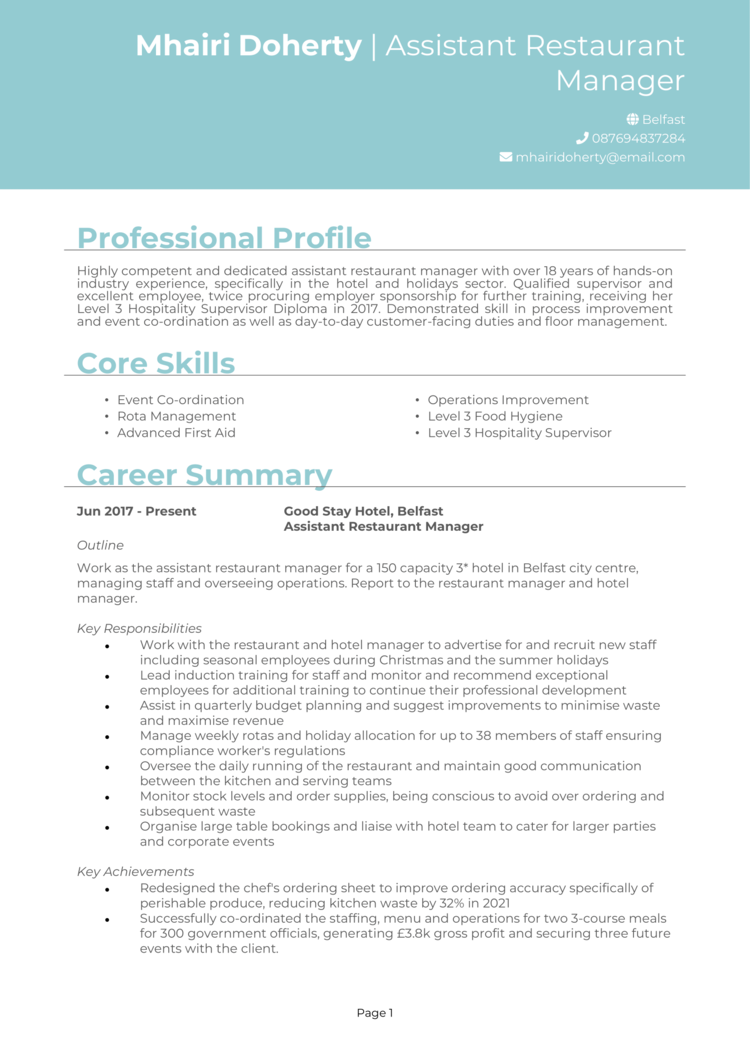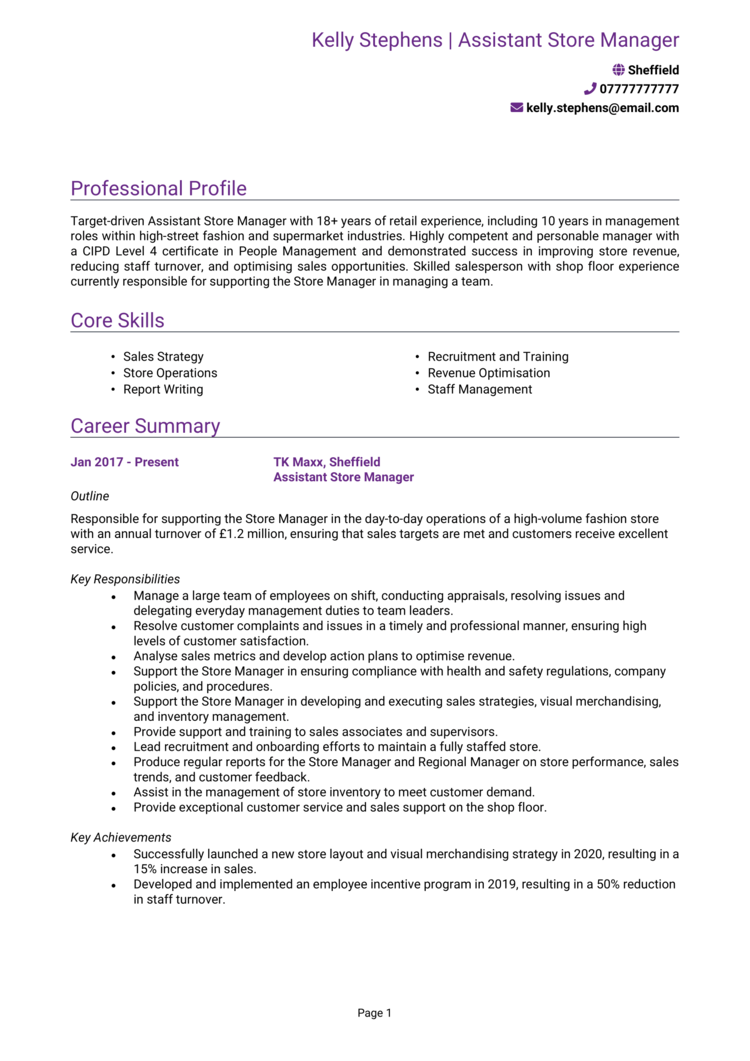As an Assistant Manager, your ability to juggle responsibilities and support your team is invaluable.
But before you can manage operations or lead a team, you need to manage something else first – your CV.
Think of your CV as your management pitch: it should be clear, compelling, and generates real interest. This guide, complete with 5 Assistant Manager CV examples, will help you create a CV that showcases your leadership potential and lands you your next opportunity.
Assistant Manager CV

Assistant Bar Manager CV

Assistant Restaurant Manager CV

Assistant Sales Manager CV

Assistant Store Manager CV

How to write your Assistant Manager CV
Learn how to create your own interview-winning Assistant Manager CV with this simple step-by-step guide.
This guide will walk you through writing an Assistant Manager CV that highlights your leadership skills, operational expertise, and ability to support both your team and senior management. Once you’re read this article, you’ll be one step closer to a CV that positions you as the ideal candidate for the role.
Assistant Manager CV structure


Your CV needs to be as organised and professional as the processes you oversee. Recruiters want to quickly see your leadership experience, problem-solving skills, and ability to hit team goals.
Here’s how to structure your Assistant Manager CV:
- Name and contact details – Keep your contact details at the top so recruiters can easily contact you when they’re ready to hire. Including a photo is optional for most roles.
- CV profile – Craft a concise summary of your leadership experience, team management skills, and key achievements.
- Core skills – Quickly list off the key strengths like team coordination and budget management which make you a good fit.
- Work experience – Walk through your past roles in reverse chronological order, focusing on responsibilities and measurable outcomes.
- Education – Highlight your academic achievements, such as degrees and certifications, that demonstrate your expertise.
- Additional info – Here’s an optional section to mention professional memberships, interests, or recognitions like “Employee of the Month.”
How to format your Assistant Manager CV


Just like a cluttered desk can slow you down, a poorly formatted CV can stop a recruiter in their tracks. Your CV format should mirror the clarity and professionalism you bring to your role. Even the most skilled Assistant Manager can miss out if their CV is disorganised or hard to read.
Formatting tips for an Assistant Manager CV:
- Bullet points – Break down tasks and achievements into easy-to-read lists.
- Divide sections – Use bold headings and consistent spacing to make your CV easy on the eye and even easier to navigate
- Use a clean font –Use a simple, professional font and keep your layout uncluttered for maximum readability.
- Keep it under 2 pages – Aim for no more than 2 pages. This gives you space to detail your experience while keeping it concise enough to respect the recruiter’s valuable time.
The best way to write an Assistant Manager CV profile


The profile is your chance to summarise why you’re the perfect fit for the role, before the recruiter gets distracted by another CV. For an Assistant Manager, this section should highlight your leadership, operational expertise, and commitment to achieving team goals.
Assistant Manager CV profile examples
Profile 1
Organised Assistant Manager with five years of experience in retail, focusing on team supervision, sales optimisation, and customer satisfaction. Skilled in managing daily operations, motivating staff, and achieving store targets. Proficient in using POS systems and inventory management software.
Profile 2
Reliable Assistant Manager with three years of experience in the hospitality sector, specialising in staff training, conflict resolution, and maintaining high service standards. Experienced in coordinating schedules, handling customer inquiries, and ensuring smooth day-to-day operations.
Profile 3
Proficient Assistant Manager with over seven years of experience in the logistics industry, adept at optimising workflows, managing warehouse operations, and leading cross-functional teams. Skilled in using ERP systems and performance tracking tools to improve efficiency and meet KPIs.
What to include in your Assistant Manager CV profile
Tailor your profile to the role by emphasising your most relevant experience and skills.
What to include in your Assistant Manager CV profile:
- Where you’ve worked – Mention industries or businesses where you’ve gained management experience, such as retail, hospitality, or corporate settings.
- Your top qualifications – Highlight leadership training, certifications, or degrees in business or management.
- Key leadership skills – Include abilities like motivating teams, streamlining operations, and resolving conflicts.
- People you’ve worked with – Reference collaboration with teams, customers, and senior managers.
- Onboarding processes – Mention any experience training up new teams and onboarding fresh recruits.
- Tools and processes you’ve managed – Mention experience with inventory systems, scheduling software, or performance tracking.
Core skills section


Your core skills section is a quick snapshot of the abilities that make you a great Assistant Manager. Focus on a mix of leadership, operational, and customer-focused skills.
The job advert conveniently tells you all the skills the employer is looking for, so make full use of it and tailor your skills to the role.
Skills to include in a Assistant Manager CV
- Team Leadership – Coordinating, motivating, and supporting staff to meet goals.
- Budget Management – Tracking expenses and managing resources to maximise efficiency.
- Staff Training – Onboarding new employees and providing ongoing skill development.
- Performance Monitoring – Evaluating team performance and implementing improvements.
- Scheduling and Rotas – Creating fair and efficient work schedules for staff.
- Inventory Management – Ensuring stock levels meet demand and preventing shortages.
- Conflict Resolution – Mediating disputes to maintain a positive work environment.
- Sales Analysis – Monitoring KPIs and identifying opportunities to boost revenue.
Work experience


What better way to show you’re ready to manage than a record of how you’ve already done it successfully? Your work experience section is where you show how your leadership skills and management expertise have made a difference in past roles.
List your roles in reverse chronological order. If you’re newer to management, include team leader roles or other positions where you demonstrated leadership potential.
How to format previous jobs in your CV correctly

- Outline – Briefly describe the company, your role, and the size of the team or operations you managed.
- Responsibilities – Highlight tasks like scheduling, training staff, or overseeing daily operations. Use action verbs like “managed,” “coordinated,” or “improved.”
- Achievements – Include measurable outcomes, such as reducing operational costs, increasing customer satisfaction, or exceeding team targets. Use numbers to show your impact (e.g., “Improved team productivity by 20%”).
Example jobs for Assistant Manager
Assistant Manager | ALP Sports
Outline
Supported the Store Manager of a retail chain by overseeing daily operations, managing staff, and driving sales. Focused on maintaining high customer satisfaction and achieving financial targets.
Responsibilities
- Supervised a team of 15 staff, delegating tasks and providing performance feedback.
- Assisted with stock management, including inventory tracking and replenishment.
- Resolved escalated customer issues professionally to ensure satisfaction.
- Prepared sales reports and analysed trends to recommend improvements.
- Supported the Store Manager with hiring, training, and staff development initiatives.
Achievements
- Increased monthly sales by 12% through improved merchandising and upselling techniques.
- Reduced staff turnover by 15% by implementing a mentoring programme.
- Recognised for maintaining top customer satisfaction scores across the region.
Assistant Manager | 192 Street
Outline
Worked as an Assistant Manager in a high-volume restaurant, ensuring efficient service delivery and smooth operations. Focused on staff management and customer satisfaction during peak hours.
Responsibilities
- Coordinated daily schedules and managed a team of 20+ employees during shifts.
- Monitored customer feedback to address issues and improve service quality.
- Assisted in managing budgets, tracking expenses, and ensuring cost efficiency.
- Conducted regular training sessions to improve team skills and knowledge.
- Maintained compliance with health and safety regulations during operations.
Achievements
- Increased table turnover rate by 10% during busy periods through workflow optimisation.
- Reduced operational costs by 8% by identifying inefficiencies in resource allocation.
- Achieved a 95% customer satisfaction score through enhanced team performance.
Assistant Manager | Davison Logistics
Outline
Supported warehouse operations for a logistics company, focusing on team supervision and process optimisation. Ensured timely dispatch and delivery of goods while maintaining safety standards.
Responsibilities
- Supervised a team of 25 staff, ensuring adherence to productivity targets and safety protocols.
- Monitored stock levels and coordinated with suppliers to avoid delays.
- Managed shift schedules and provided training for new employees.
- Analysed workflow processes to identify and implement efficiency improvements.
- Reported operational performance to senior management, highlighting areas for improvement.
Achievements
- Reduced order processing times by 15% through process reengineering.
- Improved team productivity by 20% by introducing performance tracking tools.
- Recognised for achieving zero safety incidents over a one-year period.
Education section


The education section is where you show that your skills aren’t just learned on the job – they’re backed by professional training and academic credentials. Include degrees in business or related fields, leadership certifications, and relevant professional development courses.
List qualifications in reverse chronological order. For newer candidates, emphasise coursework or projects that demonstrate transferable skills.
The best qualifications to boost an Assistant Manager CV
- Level 3 Diploma in Leadership and Management – Provides foundational leadership training.
- Level 3 NVQ for Team Leaders – Demonstrates skills in managing and motivating teams.
- Bachelor’s Degree in Business Administration – Highlights expertise in operations and management.
- Customer Service Excellence Certificate – Validates your ability to handle customer interactions effectively.
- Health and Safety Certification – Ensures knowledge of workplace safety practices.





